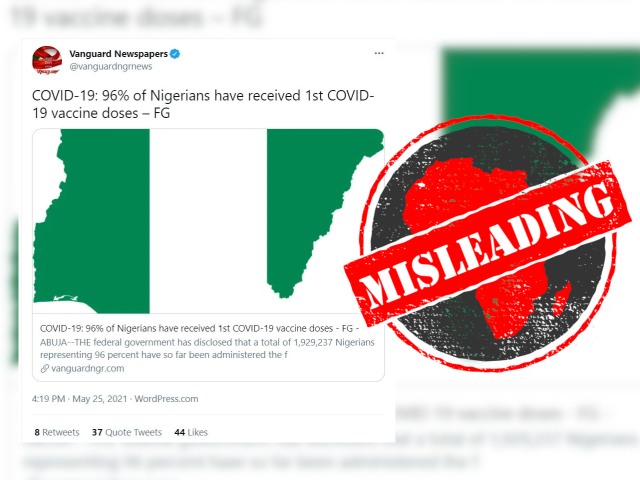Does its larger territory explain why insecurity is a persistent headache for Nigeria’s north-west state of Kaduna?
This was the gist of reported remarks by Kaduna governor Nasir El-Rufai at a high level summit in the south-west state of Ekiti in October 2021.
He spoke about insecurity in the country, particularly in the north where Boko Haram insurgents and bandits regularly target communities and even military bases.
The governor said the sheer size of his state, which neighbours Nigeria’s capital of Abuja, meant there were “many ungovernable spaces” and security personnel, which he gave as 11,000 police officers, were not enough.
“There is a major difference between security in headlines and security in facts. Kaduna state has 46,000 square kilometres of land,” El-Rufai said.
“I joke with my south-east governor friends that the whole of five states of the south-east can fit into Kaduna state two and a half times,” he reportedly said. Nigeria has six geopolitical zones: north-west, north-east, north-central, south-west, south-south and south-east.
The governor’s maths was off – the five states in the south-east zone have a combined territory of 29,525 square kilometres, more than half of Kaduna’s 46,053 square kilometres.
El-Rufai would repeat this argument in December 2021 during a visit to president Muhammadu Buhari.
But does it hold up to scrutiny? We asked security analysts.
No single solution to different security challenges
Vitus Ukoji is the coordinator of Nigeria Watch, a research project at the University of Ibadan that tracks violence, conflict and human security in the country.
He told Africa Check that the different types of security challenge required different approaches.
“Security challenges are handled with a good understanding of what is really happening in the affected area,” Ukoji said.
“For instance, you must consider the number of security agents in Kaduna compared to the number in the south-east, and the nature of the conflicts and criminal activities going on both sides.”
Ukoji said territory size was a factor because if other factors were the same, managing security in a larger territory would be more difficult.
“But there are a lot of differences between Kaduna and the south-east,” he said. “Generally, it is not right to make this kind of straightforward comparison.”
According to media reports, attacks by bandits are the biggest security challenge in Kaduna, one of the most affected states in the north-west zone.
In the south-east, there have been assaults and killings related to secessionist agitation, especially the enforcement of “sit-at-home” orders by suspected members of the Indigenous People of Biafra organisation.
Kaduna’s long and unique history of conflict
Some Nigerian media houses have sought to highlight the differences between the zones. SBM Intelligence, a geopolitical intelligence platform in Nigeria, also tracks violence in the country.
Joachim MacEbong is a senior analyst at the organisation. He told Africa Check the security territory claim was like comparing apples to oranges.
“No matter the size, you cannot compare one state with a region made of five states in terms of management of security,” he said.
“The southeastern states have five different governors and each of them has a different approach to managing security. Even within the south-east, there are slight differences in security challenges from state to state.
“For instance, the sectarian crisis in southern Kaduna is peculiar to that area. You don’t find that in the south-east. Also, the killings and human rights abuses against the Shiites in Zaria are also peculiar to Kaduna state.”
The state has experienced ethnic and religious crises for decades, conflicts between Hausa-Fulani settlers in northern Kaduna, which is predominantly Muslim, and the more than 60 mainly Christian communities in southern Kaduna.
These clashes have been so drawn out that in May 2021 both sides submitted memos to the National Assembly seeking to amend the country’s constitution and split the state into two: Gurara in the south and New Kaduna in the north.
Large number of military institutions in Kaduna
Both Ukoji and MacEbong pointed out that Kaduna had an unusually large number of military formations and institutions.
“Kaduna is probably the state with the highest number of military installations in the country,” MacEbong said.
“One would ordinarily think that is an advantage in terms of security but it is difficult to explain why bandits are kidnapping and killing people in the state at a high rate. Bandits even attacked and killed soldiers in the Nigeria Defence Academy, a military university in Kaduna.”
Kaduna is also home to other military institutions such as the Nigerian Army First Division, Armed Forces Command and Staff College, Nigerian Military School, Nigerian Air Force Base, Air Force Institute of Technology, Army Training Depot, Defence Industries Corporation, Nigerian Army School of Artillery and the Nigerian Navy School of Armament Technology.
‘Solution is political’
Kunle Olawunmi, a professor of global security studies, told Africa Check that the comparison showed that many politicians didn’t know enough about security issues and the answer was not always more boots on the ground.
Olawunmi is a retired naval commodore with over three decades of experience in military intelligence. He heads the department of criminology and securities studies at Chrisland University, Abeokuta, and is also the international senior programme director at the Global Counter-Terrorism Institute.
“Politicians are not security experts. Security is not about space,” Olawunmi said. He attributed many of the country’s major security problems to politicians, such as their use of armed youth in politics.
“The solution to the security problems in Nigeria is not … about security personnel or buying weapons,” he said. “It is political."




Add new comment